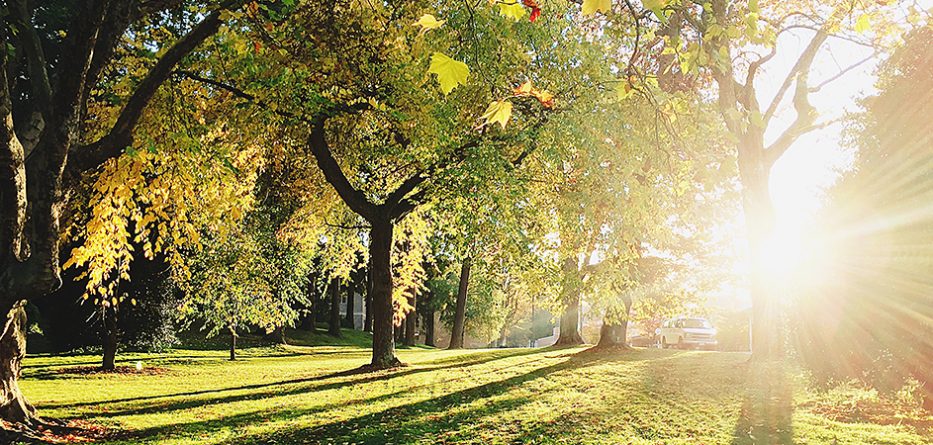Our view of our common home and our relationship to God are closely linked.
How many Christmas trees have you seen recently? We decorate trees for festive occasions; we shelter under them in the heat; we admire their beauty. We also tear them down to make way for cultivation, and turn them into wood chip and paper.
The world’s forests are effectively the lungs of our planet and its inhabitants. Does our ecospirituality address the wonder and waste that accompany our appreciation of and use of trees?
This issue is one among many which gave rise to the encyclical of Pope Francis in 2015 which was entitled Laudato Si: On the Care of Our Common Home.
There is a vital link between the way we view our common home and the way we relate to God. It also works the other way: the way we relate to God affects the way we view our common home.
Ecospirituality framework
The following is an overview of a framework for ecospirituality. One of the key features of this framework is its integration of contemporary ecotheology and spiritual practice.
The Sisters of Mercy developed five principles which invite you to:
- Recognise that the universe is a dynamic entity, within which all is interconnected yet distinct;
- Cultivate an open, attentive and receptive attitude in order to enter into transformative, mystical encounters;
- Acknowledge the indwelling presence of the Spirit in Earth and cosmos;
- Acknowledge that in Jesus Christ the God of love embraces the cosmos in healing solidarity; and
- Live in right relations within the community of creation.
The first principle looks outward at the global context and considers some of the crises facing our planet. Our approach is not working. We need to change.
It is recognised that this amounts to a new geological epoch, the Anthropocene where “(t)he human imprint on the environment has now become so large and active that it rivals some of the great forces of nature in its impact on the functioning of the Earth system”.[i]
Understanding the universe
Scientific findings during the past century in fields such as cosmology and evolutionary biology have seriously challenged the way we understand the origins and unfolding of the universe, and the place of humans within that. Traditionally, we viewed the planet as fixed, once and for all. We now know that it is constantly emerging and growing into greater complexity and consciousness. We need to locate our human story with that much bigger story, and recognise the interconnectedness of all that is.
The second principle is about spirituality in general and ecospirituality, in particular. We cannot create mystical encounters which are a feature of such spirituality, but we can set the scene by being open, attentive and aware. Ecospirituality, in particular, recognises that nature has a sacred inner dimension and encourages us to immerse ourselves in it.
The next three principles provide a specifically Christian approach to what I call a theologically-informed ecospirituality.
The theology is Trinitarian, beginning with a theology of the Spirit. Elizabeth Johnson[ii] identifies a neglect of the theology of the Spirit as a root cause for our abuse of Earth and cosmos. In the light of evolutionary science, she opens our understanding of God’s presence to include God’s continuous creation where the God of love accompanies the unfolding of all that is without intervening in natural processes.
Accompaniment
In ecotheology, and in Principle 4 of this ecospirituality, we embrace a Christology of solidarity and accompaniment.
In Jesus Christ, the God of Love embraces the cosmos in healing solidarity. Our traditional Christology encourages us to seek redemption by escaping from our material existence in favour of our heavenly one.
In this Christology we place greater value on Christ as ‘liberating, healing and inclusive love’ whose message led to his dreadful death, and whose resurrection prompts us to look towards fullness of life, but not at the expense of ignoring our earthly reality.
What follows from this is action. Our Principle 5 urges us to ‘live in right relations within the community of creation’.
There are good practical and theological reasons why we should do this. The evolutionary story reminds us of our biological kinship with all of reality. We are part of the Earth community; and with God we are all part of the community of creation.
We are all part of an embrace, interconnected yet distinct. We must step up to protect our kin, and we do this in solidarity with the God of love.
In 2000 Sr Mary Tinney rsm persuaded the Sisters of Mercy that they needed an ecological ministry and so Earth Link was set up. “We had a vision of a world where there is respect, reverence and care for the whole Earth community. We are convinced that deep bonding with Earth and cosmos is at the heart of the ecological conversion called for by several Popes. We committed ourselves to ecospirituality and sustainable living.”
By Sr Mary Tinney RSM. Reproduced with permission from Madonna Magazine, a publication of Jesuit Communications Australia.
[i] Clive Hamilton, Defiant Earth: The Fate of Humans in the Anthropocene (Sydney, Allen and Unwin, 2017), 41.
[ii] This article is influenced by Elizabeth Johnson, Ask the Beasts: Darwin and the God of Love (London: Bloomsbury, 2014)








